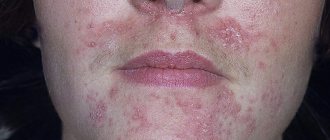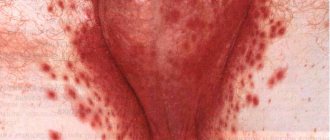Quite often, men and women suffer from unbearable itching and burning in the genital area. In some cases, the reasons may be trivial - poor hygiene or an allergic reaction. But often various diseases can provoke discomfort, which in most cases can be easily treated if you consult a doctor in a timely manner.
If you experience any discomfort in the genital area, you should consult a doctor, as a possible cause may be diseases that, if not treated promptly, can cause complications.
Causes of itching and burning of the genitals in women
In women, burning and itching in the vagina can be caused by:
- Inflammatory diseases:
- cervicitis – inflammation of the cervix;
- endometritis – inflammation of the uterine mucosa (endometrium);
- vaginitis – inflammation of the vagina;
- vulvovaginitis – inflammation of the vagina and vulva.
In addition to itching, pain in the lower abdomen and discharge from the genitals are noticeable, which is explained by the infectious origin of the disease. Possible pain during urination and sexual intercourse.
- Hormonal changes. During menopause, due to a decrease in the synthesis of sex hormones, the mucous membranes and skin around the vulva dry out and become thinner, which causes discomfort. The genitals may itch during pregnancy and during the menstrual period, which is explained by hormonal imbalances.
- Contraceptives. Birth control pills change hormonal levels, which affects the functioning of the entire body. There may be a decrease in lubricant production, resulting in dryness and increased sensitivity of the vagina, which causes itching. Some contraceptives (condoms, vaginal caps) can cause allergies, which also causes itching.
- Atrophic vaginitis, kraurosis of the vulva. During menopause, estrogen synthesis decreases, which is accompanied by atrophy and dryness of the vagina and vulva. Due to insufficient hydration, a woman may feel a burning sensation after sexual intercourse or even while walking.
- Lichen sclerosus. A rare disease that mainly affects postmenopausal women. Usually the pathology is localized on the labia and anus. The skin acquires a characteristic shine, and white spots are clearly visible on it. Over time, the mucous membranes and skin crack, which causes itching and burning, especially when urinating.
Itching in the intimate area
Insufficiently frequent washing and wearing underwear, which is a barrier to air flow to the external genitalia, can cause discomfort in the groin. You need to wash yourself regularly, using a product that does not disturb the natural pH balance of the intimate area, for example, Epigen Intim gel. It is also better to avoid unnatural fabrics when choosing everyday underwear. Cotton underwear that fits properly will allow the skin to “breathe”. It is also worth choosing high-quality hygiene products: pads, tampons, etc.
How to get rid of itching in the intimate area? Firstly, you must immediately seek help from a specialist. A specialized specialist will conduct an examination and, depending on your medical history and complaints, prescribe an individual set of additional studies, on the basis of which a treatment plan will then be proposed. In each situation, getting rid of irritation of the mucous membrane will be different. If the itching is caused by a disease, then drug therapy will be recommended: suppositories, tablets. As part of complex therapy, Epigen Intim spray, which has an antipruritic effect, can be prescribed.
Epigen Intim spray is a medicine that has a complex effect: anti-inflammatory, antipruritic, antiviral, immunostimulating, and regenerating. It helps eliminate inflammation, swelling and redness of tissues, relieve itching and increase local immunity in the vagina. The drug promotes healing and restoration of the integrity of damaged mucosa, due to which the protective function of the mucosa will be restored and the number of lactobacilli will increase.
The active component is activated glycyrrhizic acid, obtained by extraction from licorice root. Epigen Intim spray is available in pharmacies without a doctor's prescription. Pregnant and lactating women can also be treated with it. The drug is applied both externally and intravaginally, depending on the disease.
To avoid discomfort in the intimate area, you must follow simple rules.
- At least once a year, undergo not only an examination by a gynecologist, but also a full medical check-up.
- Avoid factors that disturb the pH balance of the intimate area: choose the right product for daily hygiene, use mainly cotton underwear for everyday wear.
- Be more careful when choosing a sexual partner and give up promiscuous sex life. Regular sex with one partner and timely preventive examinations will help minimize the risk of contracting sexually transmitted diseases.
- Avoid hypothermia, do not take antibiotics without a doctor's prescription
- Try to be less nervous and worry.
Causes of itching and burning of the genitals in men.
In addition to general causes, intimate itching in men can be provoked by:
- Urolithiasis disease. The main signs are frequent, usually painful, intermittent urination, purulent and bloody impurities in the blood, digestive disorders, and lower back pain. But in some cases, burning, tingling and pain in the penis area are possible.
- Balanoposthitis. When the glans penis and foreskin are inflamed, redness, swelling, itching, burning and pain in the genital area are observed. Rashes, cracks, erosions and ulcers appear on the foreskin. Lymph nodes swell. Symptoms worsen with sex.
- Prostatitis. Inflammation of the prostate gland disrupts the process of urination. There may be difficulty urinating, as well as frequent urge to go to the toilet, spontaneous release of urine. Itching and burning in the urethra, at the tip of the penis and in the perineum, early ejaculation, erectile dysfunction, pain in the lower back, pain during defecation, and a general deterioration in health are also observed.
Non-communicable causes
Other reasons can also cause itching and redness in the groin in men.
Allergies
The thin skin of the inguinal folds and scrotum is susceptible to many allergens. It can be:
- food products;
- detergent components;
- linen fabrics;
- lubricant for sex;
- condom material.
When the factor that caused the allergy is eliminated, improvement occurs. Tests for immunoglobulins and the immune status of the blood help to identify allergies.
More often, allergies occur in the form of atopic dermatitis - dry redness and peeling in the groin in men; If small blisters appear against a background of redness, they speak of eczema.
Prickly heat
A groin rash in men and itching can be caused by wearing tight or synthetic underwear. The condition is aggravated by staying in a hot atmosphere, long trips, when there is no opportunity to wash with soap and allow the body to breathe.
The essence of prickly heat is that sweat is actively secreted, and the sweat glands are clogged with sebaceous secretions and skin flakes. White nodules and red spots appear in the inguinal folds.
Systemic diseases
Diabetes mellitus, liver and gallbladder diseases, kidney failure, and psoriasis can provoke itching. In all such cases, there are other important symptoms of these ailments, and itching all over the body, and not just in the groin. With iron deficiency anemia, itching intensifies during contact with water.
Psychological reasons
In some cases, the cause of severe itching in the groin in a man may be general nervousness or obsessive-compulsive disorder. Scratching injures the skin, a streptococcal infection gets into the scratches, and inflammation begins.
Diagnostics
First of all, the doctor asks about complaints, studies the medical history and conducts an external examination, after which he sends for a diagnostic examination.
For women, diagnosis includes:
- gynecological examination;
- general and biochemical blood test;
- blood test for hormones;
- analysis of vaginal smear and discharge;
- DNA-based tests;
- Pap test;
- Ultrasound of the pelvic organs;
- colposcopy or biopsy.
If necessary, the gynecologist will refer you for consultation to other specialists: urologist, dermatologist, venereologist, allergist, gastroenterologist, endocrinologist.
Men are referred for tests:
- blood and urine;
- smear and scraping;
- sperm and prostate secretions;
- DNA.
Herbal treatment
In treatment, medicinal herbs provide invaluable assistance. At the same time, herbs are an ideal preventive remedy; they are no less popular in cosmetology.
Chamomile
This is an effective quality plant that can save a woman from a huge number of problems and various inflammatory diseases.
You can use a decoction or infusion of chamomile to care for your intimate area. This is an ideal replacement for modern hygiene products in the cosmetology industry.
Calendula
This is a magical remedy that ideally helps with problems such as candidiasis and various forms of inflammation. This plant is used for douching. For this purpose, take a tablespoon of herb to about 200 ml of boiling water, all this is infused at a temperature of about 60 degrees.
You can take it after cooling the infusion to a comfortable room temperature. Procedures based on calendula can effectively replace all medications for thrush. There are no side effects observed. Herbal treatment can take a long time, but gives a fairly long-term effect. With the help of herbs, you can slowly and at the same time truly get rid of serious pathologies and inflammations.
If the process of treatment with chemicals has already begun, herbs should not be excluded
.
Herbal infusions will significantly speed up the overall healing process, and also neutralize the most negative consequences of the adverse effects of microbes on the body. [media=
https://youtu.be/MNVTAJcqGW4
]
Which doctor should I go to if symptoms of herpes appear in the intimate area?
Sick people often want to know which doctor will help cope with the infection.
Especially if its severity is quite strong, and there is neither the strength nor the desire to wait for the rash to disappear on its own.
In most cases, you should contact a dermatovenerologist.
This doctor treats diseases that are transmitted from one person to another during sexual intercourse.
And genital herpes just belongs to this group of infections.
In addition to a dermatovenerologist, a urologist or gynecologist, if we are talking about a woman, can provide assistance to the patient.
These doctors who work with the genital organs know the symptoms of herpes, and also understand the principles of diagnosis and subsequent treatment of the pathology.
In rare cases, consultation with an immunologist or infectious disease specialist is required.
Patients want to know where to go if specific rashes appear.
First of all, you should visit a skin and venereal disease clinic or clinic.
This is where you can find the specialists needed to prescribe and monitor treatment.
A private medical center can always serve as an alternative to government institutions.
There you can undergo any necessary examinations and then be treated for infection.
Summing up
Irritation and inflammation in the groin area often occurs due to improper and irrational nutrition. In most cases, changing your diet is enough to eliminate the problem. Fungi and similar microbes thrive in an acidic environment, which is created by sugar, dairy products and yeast bread
.
If you exclude them from your daily diet, you can completely forget about any problems with inflammatory processes and irritation in the groin area. Very often, to completely get rid of pathology, it is enough to simply cleanse your body. Literally after a couple of days there is a significant improvement in the general condition, all irritating symptoms go away.
Typical symptoms of genital herpes
During the incubation period, while the virus increases its power in the body, the person does not make any complaints.
Symptoms first appear after the pathogen has multiplied sufficiently.
It has already caused enough damage to the body to cause clinical symptoms.
The infection then proceeds in several stages.
- Manifestation . Symptoms during this period do not differ from any infectious disease. The patient complains of weakness, fever, fatigue and other nonspecific signs of changes in the body.
- Primary manifestations . The genitals turn red, severe itching appears, causing serious discomfort, sometimes preventing normal sleep at night. Pain syndrome may occur.
- Progression. The redness is covered with specific blisters, which are well known to any person who has ever had herpes. The blisters are filled with transparent contents and often continue to itch.
- Permission. After a few days, the blisters burst, leaving ulcers in their place. The ulcers may also be itchy and painful. Also during this period there is a high probability of secondary infection. The infection makes its way deep into the body.
- Healing . The ulcers begin to heal, completely disappearing after an average of 1.5-2 weeks. Itching and other unpleasant symptoms subside.
Herpes in the intimate area: features of viral infection
The reasons for the development of herpes in the genital area are well known.
The main factor is the entry into the body of a small virus, which is called in medical practice the herpes virus of the second type.
It is characterized by damage to the genital area with the appearance of characteristic rashes on the skin.
The disease affects both men and women equally often.
Moreover, as doctors note, today it is quite difficult to meet a person who has not been in contact with this infection throughout his life.
Herpes has one significant feature.
It begins to actively manifest itself if a person’s immunity decreases.
This can happen, for example, against the background of other infectious diseases, due to congenital or acquired pathologies of the immune system, or with HIV.
Once the virus has entered the body, it will no longer be possible to destroy it.
The person’s task in this case is to suppress the activity of the pathogen with the help of special medications.
Then maintain immunity at a high level to avoid relapses in the development of pathology.
The average incubation period for infection is several weeks.
However, if the immune system of a sick person is strong, the virus may not appear for years.











